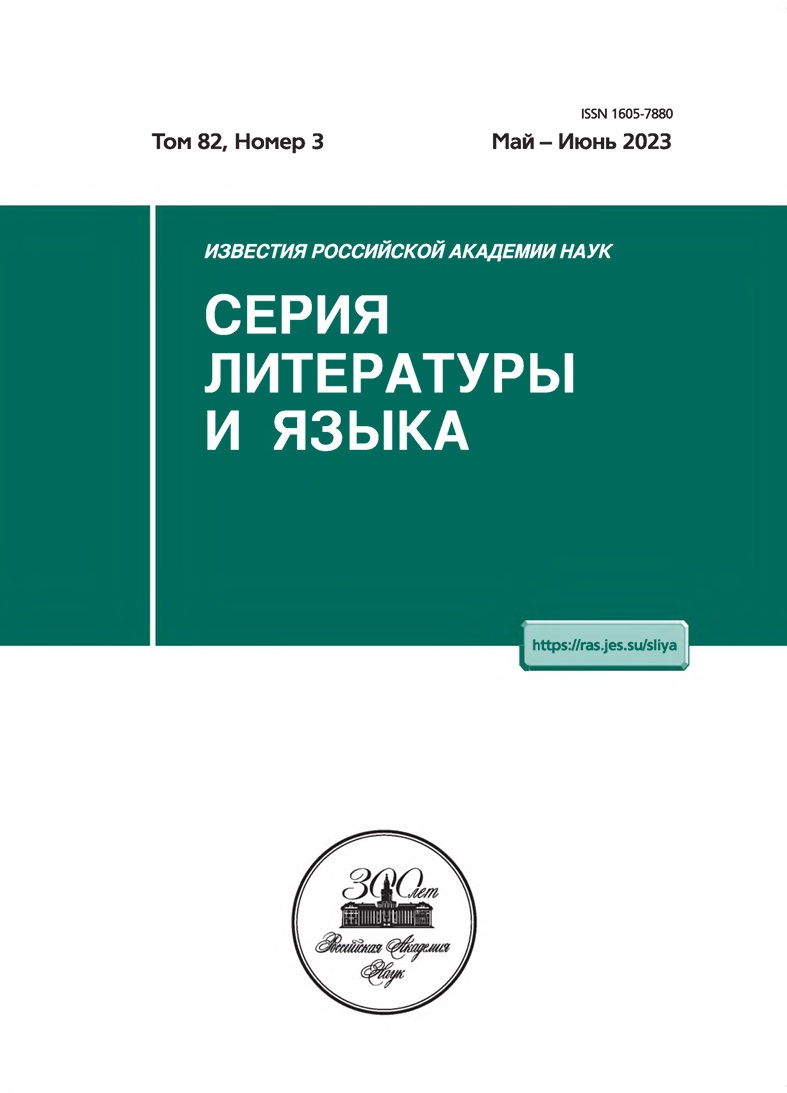On the Beginning of Author’s Lexicography in Russia
- Autores: Дружинин П.1
-
Afiliações:
- V.V. Vinogradov Russian Language Institute of the Russian Academy of Sciences
- Edição: Volume 82, Nº 3 (2023)
- Páginas: 101-111
- Seção: From the History of Philology
- URL: https://kld-journal.fedlab.ru/1605-7880/article/view/656969
- DOI: https://doi.org/10.31857/S160578800026320-8
- ID: 656969
Citar
Texto integral
Resumo
The article presents an overview of the updated history and chronology of the initial stage of the author’s lexicography in Russia, based on a corpus of previously unknown archival documents, as well as some lost publications of the 19th century. It seems that the beginning of academic author’s lexicography can be traced since 1842, when Moscow academicians led by Ivan Davydov put forward the idea of the need for the participation of the Imperial Academy of Sciences in compiling dictionaries of the language of writers. In 1848 they formulated the “Rules for compiling dictionaries or indices of the classical Russian writers&8j1;, having completed the first indexes of words of the works of Lomonosov and Karamzin. It is established that the activity of the Academy of Sciences on the creation of Pushkin’s language dictionary was started in 1848; and by 1849, according to the program of Moscow academicians, the first indexes of words were compiled for the works of Gavriil Derzhavin and Vasily Zhukovsky. The project of Piotr Bilyarsky to create the dictionary of the language of Mikhail Lomonosov is described in detail and the true reasons for the failure of this large-scale project are explained. Another attempt to compile the dictionary of Lomonosov’s language, by Anton Budilovich (1871), is regarded as the first published dictionary of the writer’s language in Russia. The article presents the analysis of the significant lexicographic work conducted by Mikhail Sukhomlinov both before being elected to the Academy of Sciences (1850s) and already as a member of the Academy (1870–1880s). The paper is completed by a description of the first index in the history of Russian lexicography for literary translations – Nikolay Gnedich’s Iliad and Vasily Zhukovsky’s Odyssey (1885).
Sobre autores
Петр Дружинин
V.V. Vinogradov Russian Language Institute of the Russian Academy of SciencesVolkhonka str. 18/2, Moscow, Russia, 119019 petr@druzhinin.ru
Bibliografia
- Фонякова О.И. Очерк развития писательской лексикографии в отечественном языкознании (1883–1990) // Русская авторская лексикография XIX–XX веков: Антология / РАН. Институт русского языка им. В.В. Виноградова. М., Азбуковник, 2003. С. 35–50.
- Шестакова Л.Л. Русская авторская лексикография: Теория, история, современность. М., Языки славянских культур, 2011. 463 с.
- Винокур Г.О. Словарь языка Пушкина // Винокур Г.О. О языке художественной литературы / Сост. Т.Г. Винокур. М., “Высшая школаˮ, 1991. С. 297–317.
- [Галаванова Г.П.] Словарь русского языка под редакцией Я.К. Грота... // История русской лексикографии / Отв. ред. Ф.П. Сороколетов. СПб., Наука, 1998. С. 207–239.
- Шеина П.В. Яков Карлович Грот (1812–1893) //Отечественные лексикографы XVIII–XX века / Под ред. Г.А. Богатовой. М., Наука, 2000. С. 157–172.
- Рапова Г.И. Из истории языкознания в Московском университете: 40–60-е годы XIX в.: (К вопросу об истоках формальной школы Ф.Ф. Фортунатова) // Вестник МГУ. Сер. 9. М., 1979. № 6. С. 20–28.
- Булгаков Ф.И. Немецкая партия в русской академии // Исторический вестник. СПб., 1881. Т. IV. С. 421–431.
- Бадалян Д.А. “Немецкие партииˮ в русской науке XIX столетия // Тетради по консерватизму: Альманах. М., 2020. № 3. С. 175–192.
- Королькова А.В. “Горе от умаˮ: Лексикографические исследования // Русская филология: Уч. зап. СГПУ. Смоленск, 1999. С. 24–38.
- Словарь языка Пушкина: в 4 т. / Отв. ред. В.В. Виноградов. 2-е изд., доп. Т. 1. М., Азбуковник, 2000. XXVI, 975 c.
Arquivos suplementares










